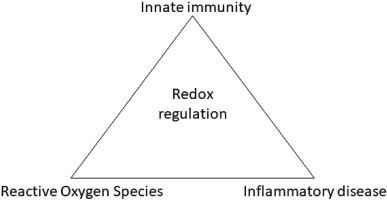当前位置:
X-MOL 学术
›
Free Radical Bio. Med.
›
论文详情
Our official English website, www.x-mol.net, welcomes your
feedback! (Note: you will need to create a separate account there.)
How the redox state regulates immunity.
Free Radical Biology and Medicine ( IF 7.1 ) Pub Date : 2019-12-30 , DOI: 10.1016/j.freeradbiomed.2019.12.022 Lisa Mullen 1 , Manuela Mengozzi 1 , Eva-Maria Hanschmann 2 , Ben Alberts 1 , Pietro Ghezzi 1
Free Radical Biology and Medicine ( IF 7.1 ) Pub Date : 2019-12-30 , DOI: 10.1016/j.freeradbiomed.2019.12.022 Lisa Mullen 1 , Manuela Mengozzi 1 , Eva-Maria Hanschmann 2 , Ben Alberts 1 , Pietro Ghezzi 1
Affiliation

|
Oxidative stress is defined as an imbalance between the levels of reactive oxygen species (ROS) and antioxidant defences. The view of oxidative stress as a cause of cell damage has evolved over the past few decades to a much more nuanced view of the role of oxidative changes in cell physiology. This is no more evident than in the field of immunity, where oxidative changes are now known to regulate many aspects of the immune response, and inflammatory pathways in particular. Our understanding of redox regulation of immunity now encompasses not only increases in reactive oxygen and nitrogen species, but also changes in the activities of oxidoreductase enzymes. These enzymes are important regulators of immune pathways both via changes in their redox activity, but also via other more recently identified cytokine-like functions. The emerging picture of redox regulation of immune pathways is one of increasing complexity and while therapeutic targeting of the redox environment to treat inflammatory disease is a possibility, any such strategy is likely to be more nuanced than simply inhibiting ROS production.
中文翻译:

氧化还原状态如何调节免疫力。
氧化应激定义为活性氧(ROS)和抗氧化剂防御水平之间的不平衡。在过去的几十年中,氧化应激是造成细胞损伤的一种观点已经演变成对氧化变化在细胞生理中的作用的更为细微的看法。这比在免疫领域更为明显,在免疫领域中,已知氧化变化可调节免疫反应的许多方面,尤其是炎症途径。我们对免疫的氧化还原调节的理解不仅包括活性氧和氮物种的增加,还包括氧化还原酶活性的变化。这些酶不仅通过其氧化还原活性的变化,而且还通过其他最近鉴定的细胞因子样功能,是免疫途径的重要调节剂。
更新日期:2019-12-30
中文翻译:

氧化还原状态如何调节免疫力。
氧化应激定义为活性氧(ROS)和抗氧化剂防御水平之间的不平衡。在过去的几十年中,氧化应激是造成细胞损伤的一种观点已经演变成对氧化变化在细胞生理中的作用的更为细微的看法。这比在免疫领域更为明显,在免疫领域中,已知氧化变化可调节免疫反应的许多方面,尤其是炎症途径。我们对免疫的氧化还原调节的理解不仅包括活性氧和氮物种的增加,还包括氧化还原酶活性的变化。这些酶不仅通过其氧化还原活性的变化,而且还通过其他最近鉴定的细胞因子样功能,是免疫途径的重要调节剂。











































 京公网安备 11010802027423号
京公网安备 11010802027423号